- Home
- Chuck Wendig
Mockingbird Page 2
Mockingbird Read online
Page 2
The bird clacks its beak and, in her head, Miriam hears: Welcome back, Miss Black.
She blinks and the bird is gone.
Peggy tries to restrain her, tries to grab her wrists, but Miriam doesn't have time. She shoves the woman back into the cash drawer with a ding.
Miriam has no idea what she's doing. She feels lost. Unmoored. And yet somehow, that wild and wobbly uncertainty feels like home.
She heads around the back of the line. Like she's on auto-pilot. Buckled into a ride she can't stop. Peggy shouts at her. Miriam can barely hear.
Those in line ogle her. They move away from her as she gets close. They don't want to give up their place in line but they don't want to be near her, either.
Two minutes now. Maybe less.
She sidles up behind the killer. The killer doesn't move. Doesn't blink. Doesn't care.
Peggy stands aside, looking stunned. Calling for someone to call the cops. Mumbling something about assault. She asks the customers for help. Help restraining Miriam. No one offers. They just want to buy their shit and get out.
Some set their stuff down and escape. Too awkward for my blood, they're probably thinking. Miriam isn't thinking about anything but the killer, the gun, and death.
"You have a gun," Miriam says to the man in front of her. Her voice croaks when she speaks, her tongue so dry it sticks to the roof of her mouth.
He turns halfway, cocking his head like a confused dog, like he couldn't possibly have heard what he just heard.
At the front of the store, Walt sees her again. And waves.
She waves back.
The man registers what she said.
"They want me to kill everyone."
"They who?"
"The voices."
You can't," Miriam says, a hollow plea. A minuteand-a-half left. She knows begging won't help. Nothing she says will matter. That isn't how it works. The rules have been clear ever since she put a bullet in a drug kingpin at the Old Barney lighthouse over a year ago. "Don't. Please."
What fate wants, fate gets.
Unless. Unless.
Unless she pays the cost. A cost of blood. Eye for an eye, tooth for a tooth, a life for a life. Only an act that big will sway fate. To change the course of a raging river, you need a big-ass motherfucking rock.
"Did the voices send you, too?" he asks
Miriam shakes her head. "No." She doesn't know who he's talking about, but she sees the way his lips form words he's not even speaking, sees the way his fingers work at the air like the legs of an overturned beetle, can smell the stink of sweat and gun oil on the man, and it's all too clear: He's nuts, crazy, a real farking moonbat.
But he's a moonbat on a terrible mission.
Before she knows what's happening, he's got the gun out. The Glock.
His hand moves fast and clips her across the top of the head with it. She sees bright white starbursts behind her eyes as she tumbles backward and falls on her butt-bone.
The chance to do what must be done is slipping away as she sits dizzy on the floor.
Everything seems to go slow. She's a flitting mosquito caught suddenly in a blob of tree sap.
A line of blood runs down the side of her nose.
She can barely find her feet to put them beneath her.
The man raises the gun straight up in the air and fires.
Screams. Movement. Chaos.
He levels the gun. Another shot. The front door shatters.
Miriam stands, head pounding, colorful flashes of light dancing in her vision. She's behind him. Her gaze drifts down the man's arm and to the sights of the gun as the weapon tracks Walt behind his row of shopping carts.
It's now or never.
Will fate get what fate wants?
She knows this store. She's been working here since before the beach season started. Who hasn't looked around their work environment and played the, "What around here could be a weapon?" game? Maybe she's alone. Maybe it's just her game. Miriam Black isn't most people. Not anymore.
She turns. Grabs something off an end-cap.
A long, stainless steel, two-pronged fork.
For barbecuing.
She stabs it into the side of the man's neck as the gun fires.
Walt screams and falls. A cart drifts away.
Blood burbles up around the fork like the water in a bubbler fountain. It begins soaking the gunman's neck and T-shirt collar.
The killer wheels on Miriam. A clumsy pirouette, the fork sticking out the side of his neck, looking like a lever you could pull to power him down.
She finds herself staring down the barrel of the Glock.
"You're the one always messing with things," he says, his lips wet with red. The words aren't angry. Wistful, maybe. Sad. Definitely sad.
A flash from the muzzle. She doesn't even hear it.
She feels it though. Her head rolls – a burning sensation in the deep of her skull like the searing gaze of Satan himself.
The man collapses sideways into a rack of shell-jewelry, faux pirate tschotskes, and beachy snow-globes filled with swirling sand instead of snowflakes. They shatter as they hit the floor.
Miriam tries to say something.
Finds her mouth is no longer connected to her brain.
For the world, that may be some kind of mercy.
But for her, it's a certain terror.
A deep and wretched darkness reaches for her and grabs hold.
INTERLUDE
The Trespasser
Miriam sits on the beach, her butt planted on a cheap white plastic chair, her hands steepled on a patio table made of the same, her toes burrowed into cold sand like a row of ostrich heads.
Sitting across from her is her first boyfriend, Ben Hodges, the back of his head blown out from the shotgun he ate so long ago. Back when they were both dumb horny teenagers in high school. They fucked. She got pregnant. He killed himself. And his mother took out her lonely mother rage on Miriam with a red snow shovel.
That day. The day Miriam was really born. The nowMiriam. The Miriam with this curse, this gift, this thing-that-she-does.
Ben clears his throat.
A pair of dark-winged birds – blackbirds, each with a dime-sized splash of red on each wing – picks at his exposed brain like they're looking for worms.
The sea slides in, the sea slides out, the ineluctable susurration of the tides.
"I knew you couldn't stay away for long," Ben says.
Except Miriam knows this isn't Ben. Once upon a time she would have said he was a figment of her imagination, a shape-shifting tormenter of her own devising, and that may still be true. But now she's not so sure. Maybe she was never sure.
"I am who I am."
"That's what we're counting on."
She unsteeples her hands and leans forward. "We. That's not the first time you've said that word."
"We are legion. The demons in your head."
"So this is all just a hallucination? You're just some asshole I made up?"
Ben says nothing. His eyes flash with mischief.
Just then, one of the blackbirds yanks its head upward, and in its beak is something that looks like a stringy tendon. Ben's left arm jerks up in the air. When the bird drops the tendon, the arm plops back at his side.
The birds, working him like a puppet.
Cute.
And then a shadow passes over Miriam. She looks up, sees a Mylar balloon floating up in the sky, moving in front of the pale disc that passes for the sun here, and when she looks back at Ben he's no longer Ben. Instead, he's the gunman. The one from the store. Replete with bloody mouth and a barbecue fork sticking out of his neck.
"So. How does it feel?"
"How does what feel?" she says, but she knows what he's really asking.
"Don't be coy. Your second kill." Again, mischief glimmers. "Or third, if you want to count your dead baby."
That hits her like a fist. She tries not to show it but just the same she leans back in her chair, l
ooks away, stares out over the gray ocean, over the foam-capped waves.
The gunman shrugs. "Guess we won't count the baby, then."
"You need a name," she says to change in conversation. "You may not have a face but I want you to have a name."
"Will I be Ben? Louis? Mommy?"
"I'm not calling you Mommy. Fucking sicko."
"When was the last time you saw her, by the way?"
She doesn't bother saying anything. He – or she, or it – already knows the answer.
"I should call you the Intruder," she says finally. "Because that's what you do. You intrude. Here I should be drifting through the darkness before my death, all peaceful and shit, and then you come along. Trespassing on my mental property. Actually, I like that. Trespasser. There we go."
"Don't pretend like you don't invite me in."
"I do no such thing."
The gunman smiles. A blackbird lands on the neckstuck BBQ fork.
"Besides," the Trespasser continues, except now it's not the gunman who's speaking but the blackbird perched on the fork's handle. Still with Ben's voice. "You're not dead. You're just in shock."
"I'm not dead?"
"Not yet. Soon, maybe. You have work to do first. We can't let you off the hook that easy, little fishy. This meeting is just our little way of saying we're glad to have you back."
"You should've brought cake," she says.
"Next time, maybe."
THREE
Just a Flesh Wound
She has to give her statement to three different cops and each of them urge her to get in the goddamn ambulance already.
As she sits on the curb, smoking like a cancer factory, the cops tell her that she might have a concussion. And that the bullet graze along the side of her head – that's what it is, a line of parted flesh and lost hair where the bullet dug a burning furrow through her scalp – might get infected.
Miriam tells them she's not getting in the ambulance.
She's not going to the hospital.
She's fine.
She doesn't have health insurance, and she doesn't have the money to compensate for not having health insurance. The last time she was in the hospital, she got walloped with a bill that had so many zeroes she thought she was at Pearl Harbor. (That bill – and all the others that followed – ended up in the trash).
The statement she gives isn't all that far from the truth. In fact, she tells them everything – even the part where she backhanded Peggy – except for that mess about psychic visions. It's not that Miriam is averse to sharing that with people. But she's tried it in the past, and it turns out the cops don't care much for the "I had a psychic vision" defense.
No reason to go kicking over hornet's nests.
Instead she tells them that she saw the bulge of the gun and saw the man start to pull it out. Nothing that happened contradicts the story.
Peggy doesn't want to press charges. Peggy doesn't even want to see her or talk to her, which is fine by Miriam.
She tries to find out more about the gunman. But nobody knows anything. Or they're not talking. Either way, it's Ignorant City, population: Miriam.
And so hours later, Miriam is free. They give her the old warning: "Don't leave the state just in case we need to talk to you again."
She hears them. But she doesn't really hear them.
She needs another cigarette.
She needs to go home.
If only she knew what that really meant.
FOUR
Home Again, Home Again, Fuckity-Fuck
The LBI causeway is a nightmare because it's always a nightmare, the island constantly binging and purging vacationers. During the summer, the causeway – a white bowing bridge over the gray-and-brown froth that is the Manahawkin Bay – is blocked like a plaqueclogged artery.
It's the one way on and off the island.
But Miriam doesn't drive. And that means she can move. The Schwinn 10-speed, the frame pockmarked with syphilitic sea-born rust, carries her past the cars – a swish of colors, a Dopplerian effect of radio stations and conversations.
The wheels turn with a flywing hum.
Her head-wound stings in the salt air.
She smokes as she rides, the cancer plume lost behind her.
It was a year ago that she first came over this causeway, heading to the island to save Louis from a fate she'd inadvertently assigned him. He was tied to a chair at the top of a lighthouse. Tortured by a monster. She saved him before he lost his second eye – and, subsequently, all brain function – and in turn learned that one special exception to her abilities.
The only way to divert death is to give it a life.
Like she did today, with the gunman. Fork him, that motherforker, she thinks, the joke pinballing around the inside of her skull. But it doesn't get funnier with each echo. Instead, it makes her feel sicker, stranger, more unstable.
You have work to do.
She shudders even in the heat.
Finally, the end of the causeway. Bay Ave gives way to Barnegat Road. Pine trees thrust up out of sandy mounds. She never thought pine trees belonged at the beach but here they are. Of course, she never thought medical waste belonged at the beach either, but that's New Jersey for you.
She ducks down Green Street, past the little surf shop, then past the dinky bait shop, all to avoid the traffic circle. That's another New Jersey thing: the traffic circles. Can't just be a regular intersection. Oh, no. Around and around. A hellish carousel of traffic that would make Dante fall down in a pile of his own sick.
You could just ride one of those circles forever, she thinks.
Swirling the drain.
That's how she feels as she heads home. Like that's all she's doing. Treading water, doggy-paddling, waiting for sharks to come or for her arms to give out or for a boat to come along and suck her into the propeller.
Home. Home. Ugh.
Home now is a 1967 Airstream Trade Wind trailer parked at the Bayview Trailer Park just outside Tuckerton. The name of the park is a bit of a misnomer, though she eventually discovered it's not a total lie – if you climb on top of one of the trailers and then scamper up the nearby telephone pole, sure as shit you can see the murky gonorrhea tides of the bay.
The trailer park is the standard assortment of miscreants and deviants. Over there, a nice older couple with a fetish for vintage Hawaiian shirts and a pair of the Chattiest Cathies she's ever had the displeasure of meeting. Next to them, a duo of college drop-outs who sell ditch-weed to other college drop-outs. At the other end of the park is a seedier contingent: a guy who makes either meth or bombs (or maybe both), a hoarder who hoards not stuff but Jack Russell terriers (the barking, the barking), and a middle-aged divorced guy who always wears flannel shirts even in the heat and who Miriam is pretty sure is a big ole kid-toucher.
A real friendly crowd.
A crowd to which she belongs. She knows this. She doesn't like it, but there it is.
Miriam waves at the nice older couple – the Moons – but is sure not to stop, lest she find herself trapped in a conversational gravity well from which there is no escape but to hack off an arm with a nearby garden trowel.
She grabs her crotch at the two pot dealers – Scudder and Nils, the former a gangly surf-bum version of Ichabod Crane, the latter a pot-bellied man-boy with a hipster beard and black-rim eyeglasses. They wave back with big dumb smiles. As is the tradition.
Then: home.
"Home."
Whatever.
Dead marigolds sit out front in a planter made of crooked bricks. Next to them stands a ceramic lawn gnome with a cracked hole in his forehead, a hole she put there with a rusty mini-golf putter she found behind the Airstream. A putter she uses for a variety of purposes: to whack pebbles off the Airstream roof, to scratch her back, to threaten both meth-heads and cockroaches alike.
The putter lays nearby, in high weeds and grass.
Crossing the threshold of that trailer cinches her stomach into tightening knots
every time.
"Lockdown," she says.
Into the belly of the silver whale.
Metal walls. Shore décor: all pastel and wood paneling and 1980s fixtures. She hasn't touched a thing. The only thing she's done to decorate in here is to hang a bird skeleton above the kitchen sink. She guesses it's a crow. She found it dead about three months back, most of its meat eaten by ants, a few feathers still clinging to dead bones.

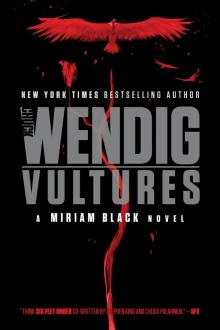 Vultures
Vultures Mockingbird
Mockingbird Wanderers
Wanderers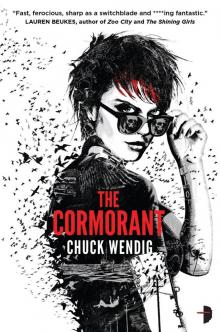 The Cormorant
The Cormorant Empire's End: Aftermath (Star Wars)
Empire's End: Aftermath (Star Wars)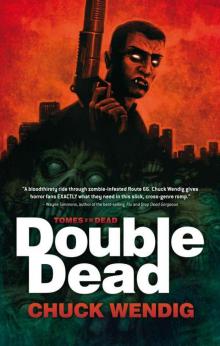 Double Dead
Double Dead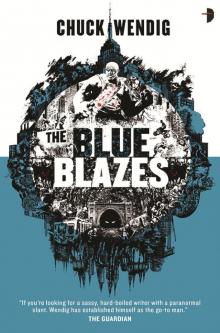 The Blue Blazes
The Blue Blazes 250 Things You Should Know About Writing
250 Things You Should Know About Writing Irregular Creatures
Irregular Creatures The Raptor & the Wren
The Raptor & the Wren Aftermath: Star Wars
Aftermath: Star Wars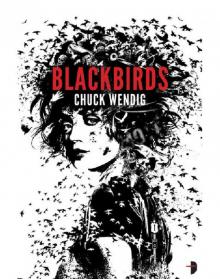 Blackbirds
Blackbirds The Hunt
The Hunt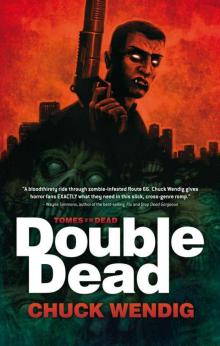 Tomes of the Dead (Book 1): Double Dead
Tomes of the Dead (Book 1): Double Dead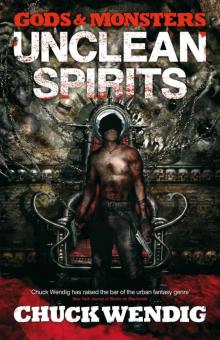 Gods and Monsters: Unclean Spirits
Gods and Monsters: Unclean Spirits The Harvest
The Harvest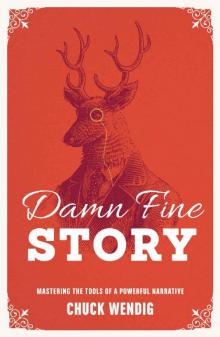 Damn Fine Story: Mastering the Tools of a Powerful Narrative
Damn Fine Story: Mastering the Tools of a Powerful Narrative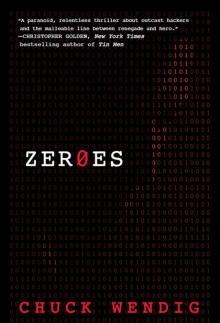 ZerOes
ZerOes Thunderbird
Thunderbird The Hellsblood Bride
The Hellsblood Bride Double Dead: Bad Blood
Double Dead: Bad Blood Life Debt
Life Debt